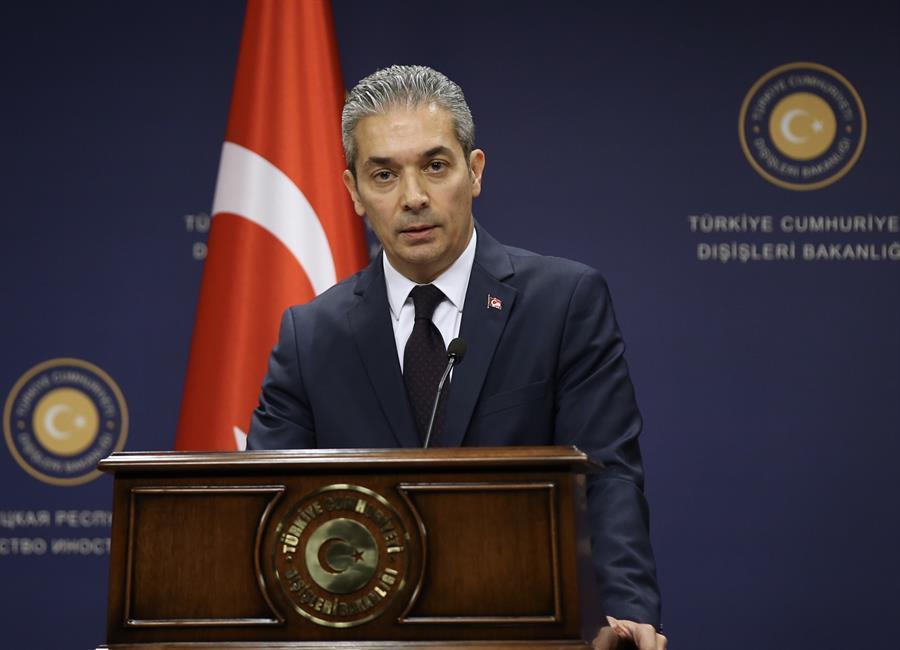
Threats from the United States will not stop Turkey from purchasing Russian-made S-400 air missile defense systems, Foreign Ministry spokesman Hami Aksoy said. The U.S. has threatened to stop the delivery of U.S.-made F-35 fighter jets to Turkey if the government moves forward with the purchase from Russia.
“The fact that the United States expresses the issue of the F-35 as a threat, by all means, is not favorable and does not correspond to our alliance relations,” Aksoy told reporters on April 26.
Turkish officials have been telling their U.S. counterparts that linking the F-35 sale to Turkey’s purchase of the Russian S-400s is a fallacy.
“We carry out our payments regularly, our pilots are receiving training [in the U.S.], and we will not back down from this,” Aksoy said.
Regarding U.S. Vice President Mike Pence’s remarks about Turkey on the sidelines of the NATO summit in Washington earlier this month, Aksoy said: “We see that the U.S. administration has restarted the use of threatening language, but we’ve seen it before it; does not work.”
Pence had said Turkey’s purchase of the S-400s could potentially pose a risk to NATO.
“It is impossible to accept this expression regarding our country. The U.S. should understand that it will not get any result through impositions,” Aksoy said.
The spokesperson also noted that Washington has yet to respond a proposal by Ankara to form a technical committee to discuss U.S. concerns that S-400s on Turkish soil could jeopardize the security of F-35s flying in Turkish airspace.
Tensions between the U.S. and Turkey have reached a fever pitch in recent months as Turkey prepares to receive the Russian air missile system that Washington says threatens Turkey’s participation in the F-35 fighter jet program and which could trigger congressional sanctions.
Ankara has proposed creating a work group to assess the impact of the S-400 on NATO systems. Turkey and the U.S. continue talks for the former to purchase U.S. made Patriot air missile defense systems, the spokesperson said. He confirmed that Turkey has received new proposals from Washington on that alternative.
Turkey also continues talks with the U.S. for a safe zone in northern Syria, Aksoy said. Turkey’s priorities for that effort are that the zone be under the control of Turkey, the YPG/PYD leave the region and that the zone has a depth of nearly 20 miles (32 km).
Turkey tries to convince the US for Iranian oil
Ankara is trying to convince the United States to allow refiner Tüpraş to continue purchasing crude oil from Iran despite ongoing sanctions, Aksoy said.
“Tüpraş follows the issue closely. The refinery is especially suitable for Iranian oil. We’re trying to convince the U.S. side. Our negotiations continue,” he stated.
The U.S. decision to end sanctions waivers damages regional cooperation and Turkey’s trade relations, Aksoy said.
Last year, Washington announced sanctions against buyers of Iranian oil, granting eight countries, including Turkey, waivers for six months. It said on April 22 it will not renew those waivers and demanded that buyers stop purchases by May 1 or face sanctions. Iran is one of the biggest oil suppliers for Turkey, which is almost completely reliant on imports to meet its energy needs.
Aksoy blames French for role in “massacring” Turks
Pushing back on France’s decision to commemorate the deaths of Armenians in 1915, Aksoy blasted the country for its role in “massacring” the Turks a century ago by arming Armenians.
“We will not forget [French President Emmanuel] Macron’s declaring April 24 as a day for commemoration [for the so-called Armenian genocide],” Aksoy said. France held its first national day of commemoration on April 24.